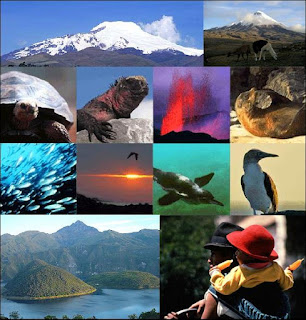By: Fausto Valero
When the well-known phrase was launched to promote our country using all the state advertising machinery (inside and outside our borders), many of us thought that it would really be in line with its essence: "the love of life" that is innate in Ecuadorians; and to demonstrate the commitment (as a people and as a state) to the greatest gift with which our Ecuador could have been privileged: biodiversity (diversity of life).
Even more so when the dreams of a Constitution that contemplated the "Rights of Nature" became a reality in ours, the one that was once called the "greenest constitution on the planet" which in its TEXT can be a "song to life."
However, the events that have been occurring for several months now, such as: mining concessions to carry out open-pit activities in highly sensitive areas with companies that do not have a very friendly history with life in other parts of the world; accusations of sabotage and terrorism against representatives of these communities (many of them an example of ethnic diversity) who oppose this type of activity in their living spaces; the intention to expand the oil frontier towards the south-east of the country (especially the provinces of Pastaza and Morona Santiago) using a mechanism of "prior consultation" that has been rejected from the beginning by the communities that live there for committing and increasing the same actions of previous experiences; and more recently, the intention of the President of Ecuador to open the way to GMOs, even though recently 8 countries in Europe prohibited this type of research in their territories due to growing social rejection (Monsanto's MON810 corn case).
A few days ago we carried out a survey on the social network Facebook addressed to random users of said network; with the question: Ecuador is promoted as a country that loves life. Do you think there is control and clear policies to be one? The results show a very clear trend: Of the 156 people who responded, 127 said they do not think there is control or clear policies to ensure this, and 29 said yes.
Several of the people who responded to this survey also left their comments, among which we can highlight:
- Christian Loaiza S.: «I think that Ecuador has everything to be considered a biodiverse country, but from the moment that image is used as a political platform, serious problems already exist, especially when economic interests are put above environmental care…»
- Andrea Novillo: "We have the laws, but not the will to comply with them, nor the moral and environmental conscience..."
- R. Guevara: «There is not yet a strong environmental culture to say that LOVES LIFE. There is no control yet... but little by little this presidency is doing something about it... but there is still a lot to do..»
- Veronica Araujo E.: «Our country's environmental laws are very good, but they are a dead letter because there are no agencies to enforce them, that is, there is no control»
- Alejandro Martinez: "It's hypocrisy."
- P. Rasa Bihari: "It's just a way of showing the good humour of the people in question. They are very funny."
- Oksana Luckyj. «A very strange way to love life»
The results of this exercise in citizen perception can either be taken to improve the concept and actions regarding a clear tendency to not believe something just because it is repeated ad nauseum; especially in a current society with a lot of access to information from sources other than the official one; or discarded by underestimating them to continue with the same practices that little by little stop convincing a growing sector of the population.
To love life, a media campaign is not required, as Byron Mora B. mentions in another of the comments: «WE, the Ecuadorian people, love life and no one disputes that». For an institution like the state to REALLY make it its own, it must ensure that its actions do not erase that passion.
![]()

